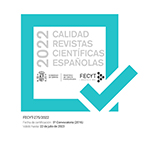Galician Matriarchy, Basque Matriarchy: Myth Revision in Álvaro Gago’s "Matria" and Asier Altuna’s "Amama"
Abstract
The article analyzes the representations of the female figure in two films that poses the issue of matriarchy in, respectively, the Galician and Basque culture: the short film Matria by Álvaro Gago (2017) and the feature film Amama by Asier Altuna (2015). Our goal is to reflect on how these films construct the image of women, what types of “feminities” they reproduce, from what perspective raise questions about female power and through which strategies review the concept of matriarchy. The study is based on the “anthropological-morphological method of film analysis” by Seweryn Kuśmierczyk founded on the idea that film reality, being a sublimated image of the world outside the screen, reflects the sociocultural context in which the film arises. In the conclusions we refer to the ambiguity of the interpretations of the feminine condition represented in the analyzed films. In spite of different attitudes of their authors towards the concept of matriarchy and in spite of using totally different languages, in the case of both films emerges their potential to deconstruct the myth of Galician and Basque matriarchy and to formulate a critical commentary about reality.
Downloads
Article download
License
In order to support the global exchange of knowledge, the journal Madrygal. Revista de Estudios Gallegos is allowing unrestricted access to its content as from its publication in this electronic edition, and as such it is an open-access journal. The originals published in this journal are the property of the Complutense University of Madrid and any reproduction thereof in full or in part must cite the source. All content is distributed under a Creative Commons Attribution 4.0 use and distribution licence (CC BY 4.0). This circumstance must be expressly stated in these terms where necessary. You can view the summary and the complete legal text of the licence.








